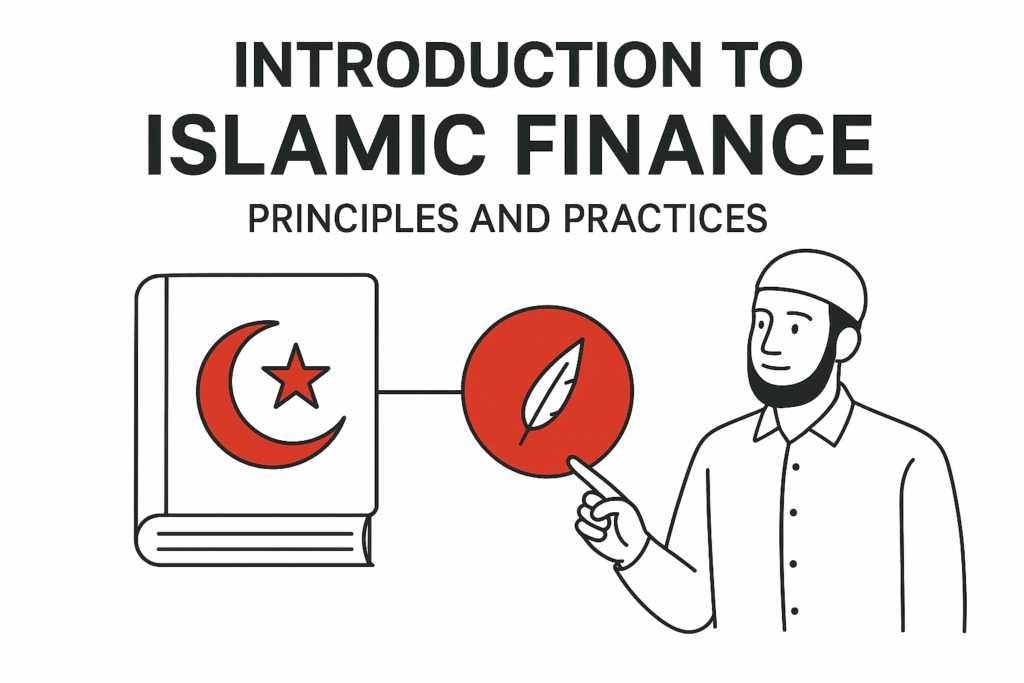Introduction to Islamic Finance: Principles and Practices

As a religion, Islam stands for “complete submission and obedience to Allah”. It is the religion of Allah the Exalted which is revealed to mankind. It is the religion that was brought by all messengers of Allah, starting with Adam (peace be upon him) to Muhammad (peace be upon him).
Islamic banking and finance is a rapidly growing sector in the global financial system. Rooted in Shari’ah (Islamic law), this industry has evolved from a niche market to a significant force in international finance. It adheres to the principles of Shari’ah, or Islamic law. It offers a distinct alternative to conventional finance by focusing on ethical investments and risk-sharing. In this blog post, we will provide an overview of the fundamental principles of Islamic finance and highlight the key differences between Islamic and conventional financial systems.
KEY CONCEPTS AND HISTORICAL CONTEXT
Islamic banking and finance is based on principles derived from the Qur’an and the Hadith (teachings of the Prophet Muhammad). These principles emphasize ethical, fair, and equitable dealings, prohibiting practices such as interest (riba), excessive uncertainty (gharar), and gambling (maysir). The historical context of Islamic finance dates back to the time of the Prophet, when early financial transactions were straightforward and based on trust and mutual benefit. The modern resurgence of Islamic finance began in the mid-20th century, with significant growth in the last few decades, spreading across the globe from the Middle East and Southeast Asia to Western financial markets.
ISLAMIC FUNDAMENTALS – SHARI’AH
SHARI’AH
- Literal meaning: watering place, path, broad way, pathway to seek salvation. “Thus, we put you on the right way (Shari’atan) of religion. So, follow it and follow not the whimsical desire (hawa’) of those who have no knowledge” (Surah al-Jathiya: 18).
- Technical meaning: What Allah the Exalted has prescribed unto mankind through the medium of the Qur’an and the last and final messenger, Prophet Muhammad (peace be upon him).
- Legal definition: “The body of laws and rulings extracted primarily from the Qur’an and Sunnah and the detailed rules of Fiqh that jurists and scholars had developed through the process of Ijtihad (independent reasoning)”.
FIQH
- It literally means the true understanding or comprehension.
- Technically, Fiqh refers to the science of understanding the derived rules obtained from their particular sources or the exercise of intelligence (ijtihad) in deciding a point of law from its sources.
- Ahkam al-diyanah (religious verdicts) – ruling on matters between a person and Allah (subhanahu wa ta’ala)
- Ahkam al-qadha (judicial verdicts) – ruling concerning verdicts before a judge or human in a court.
ISLAMIC FUNDAMENTALS – SOURCES OF SHARI’AH
– PRIMARY SOURCES:
QUR’AN (Text of God / Word of Allah (subhanahu wa ta’ala))
- The Qur’an is the foremost primary source of Islamic law. Qur’an is the verbal noun of the root word qara’a (to read), literally means reading or recitation.
- The Qur’an is defined as the book containing the speech (communication) of God revealed to the Prophet Muhammad conveyed by the angel Gabriel in Arabic and transmitted to us by continuous testimony (tawatur).
- The Qur’an is regarded as manifest revelation (wahy zahir) that is different from internal revelation (wahy batin) which consists of inspiration (ilham).
- In the case of wahy batin Allah inspired the Prophet and he conveyed the concepts in his own words. This is known as hadith.
SUNNAH (Sayings, Actions & Tacit Approvals of the Prophet [peace be upon him])
- The literal meaning of Sunnah stands for the “well-known path” or well-trodden path which is followed again and again.
- Technical meaning of Sunnah is what has been transmitted from the Messenger of Allah (peace be upon him) of his words, acts and approvals.
– SECONDARY SOURCES:
IJMA’ (Consensus – Majority of opinions of Ulama – learned jurists)
- The literal meaning of ijma’ is determination, resolution and agreement upon a matter.
- Technically: The consensus of mujtahids (independent jurists) from the ummah of Muhammad (peace be upon him), after his death, in a determined period upon a rule of Islamic law (hukm shar’i).
- The consensus of mujtahids from the ummah of Muhammad (peace be upon him) / of the Muslim community after his death, in a determined period upon a rule of Islamic law (hukm shar’i).
IJTHIHAD (Interpretation – use of human reason to demonstrate Shari’ah Law)
- Literally means striving, expending maximum effort in the performance of an act.
- Technically: Total expenditure of effort made by a mujtahid in order to infer the rules of Shari’ah from their detailed evidence in the sources through interpretation.
The primary task of a mujtahid is to discover the ahkam of the Shari’ah from the texts. This includes the following activities:
- Discover the law that is either stated explicitly in the primary sources or is implied by the texts.
- Extend the law to new cases that may be similar to cases mentioned in the textual sources.
- Discover the law for new cases that are not covered by the previous two methods.
QIYAS (Analogy – to create/adopt the permitted solution for current issues)
- Literally, qiyas means measuring or estimating one thing in terms of another, which is why scales are called miqyas.
- Technically, qiyas is the extension of Shari’ah value (hukm) from an original case (asl) to a new case, because the latter has the same effective cause as the former.
- The extension of a Shari’ah value from the original case (al-Asl) to a new case, because the latter has the same effective cause (‘illah) as the former.
CORE PRINCIPLES OF ISLAMIC FINANCE
- Prohibition of Interest (Riba): Unlike conventional banking, Islamic finance prohibits charging or paying interest. Instead, it promotes profit-sharing arrangements, such as Mudarabah (profit-sharing) and Musharakah (joint venture).
- Risk Sharing: Islamic finance encourages risk sharing between the lender and the borrower. This principle is evident in contracts like Musharakah and Mudarabah, where both parties share profits and losses.
- Ethical Investments: Investments must comply with Shari’ah principles, excluding businesses involved in activities considered haram (forbidden), such as alcohol, gambling, and pork products.
- Asset-Backed Financing: Financial transactions must be backed by tangible assets or services. Instruments like Sukuk (Islamic bonds) are structured to reflect this principle, linking returns to the performance of underlying assets.
FINANCIAL INSTRUMENTS IN ISLAMIC BANKING
Islamic financial institutions employ various Shari’ah-compliant instruments to manage funds and provide financing:
- Murabahah (Cost-Plus Financing): A common instrument where the bank purchases an asset and sells it to the customer at a markup. The cost and profit margin are disclosed upfront, and payment is typically made on a deferred basis.
- Ijarah (Leasing): Similar to conventional leasing, Ijarah involves leasing an asset to a customer for a specified period in exchange for rental payments. The ownership of the asset remains with the lessor.
- Salam and Istisna (Forward Sales): Salam involves advance payment for goods to be delivered at a future date, commonly used in agricultural financing. Istisna is used for manufacturing and construction, allowing advance payments for goods and services yet to be produced.
- Mudarabah (Profit Sharing): where one party provide the capital (rab al-maal) and the other party (mudarib) provides expertise and management to undertake a business venture. Profits generated are shared according to a pre-agreed ratio, while any losses are borne by the capital provider, provided the manager has not acted negligently or in breach of contract.
To learn more about Islamic finance and enhance your understanding of these principles, we invite you to join our online courses and programs. Visit our website, Marifa, at https://www.marifaacademy.com/ for more information.






Responses